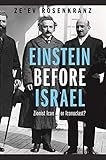Einstein Before Israel : Zionist Icon or Iconoclast? / Ze’ev Rosenkranz.
Material type: TextPublisher: Princeton, NJ : Princeton University Press, [2021]Copyright date: ©2011Description: 1 online resource (368 p.) : 24 halftonesContent type:
TextPublisher: Princeton, NJ : Princeton University Press, [2021]Copyright date: ©2011Description: 1 online resource (368 p.) : 24 halftonesContent type: - 9781400838370
- Zionism
- SOCIAL SCIENCE / Jewish Studies
- Abraham Flexner
- Abraham Fraenkel
- Ahad Ha'am
- Albert Einstein Archives
- Albert Einstein
- Alfred Dreyfus
- Aliyah
- American Schools of Oriental Research
- Anti-Zionism
- Arab–Israeli conflict
- Arthur Ruppin
- Axis powers
- Balfour Declaration
- Berliner Tageblatt
- Blood libel
- Chaim Weizmann
- Chief Rabbi
- Churchill White Paper
- Cultural Zionism
- Culture and Society
- Cyrus Adler
- Disenchantment
- Dora Diamant
- Einstein Papers Project
- Einstein family
- Eliezer Ben-Yehuda
- Emil Grunzweig
- Ernest Rutherford
- Ernest Solvay
- Felix Ehrenhaft
- First Intifada
- Franz Kafka
- Fritz Haber
- George Mosse
- German model
- Gustav Landauer
- Habilitation
- Haredi Judaism
- Harvard University
- Hebrew University of Jerusalem
- Hebrew labor
- His Family
- Hugo Haase
- Independent People
- Jehuda Reinharz
- Jewish Underground
- Jewish culture
- Jewish diaspora
- Jewish identity
- Jews
- Jingoism
- Judaism
- Kapp Putsch
- Kurt Blumenfeld
- Kurt Hiller
- Leon Simon (Zionist)
- Leon Uris
- Martin Buber
- Maurice Solovine
- Max Brod
- Max Planck
- Middle East
- Moshe Zimmermann
- Mount Scopus
- Nahum Sokolow
- Nobel Prize
- Norman Bentwich
- On the Eve
- Orientalism
- Orthodox Judaism
- Pacifism
- Pasteur Institute
- Paul Ehrenfest
- Paul Warburg
- Peace Now
- Peaceful coexistence
- Police action
- Political machine
- Post-Zionism
- Protectionism
- Prussian Academy of Sciences
- Religious antisemitism
- Revisionist Zionism
- Safed
- Secularism
- Social Darwinism
- Solvay Conference
- The Other Hand
- The Rothschilds (musical)
- United Jewish Appeal
- Walter Benjamin
- Walther Nernst
- Warfare
- Weimar Republic
- Weizmann
- West Jerusalem
- Wilhelm Ostwald
- Wissenschaft des Judentums
- Zionism
- Zionist Organization of America
- 320.54095694092
- QC16.E5
- online - DeGruyter
| Item type | Current library | Call number | URL | Status | Notes | Barcode | |
|---|---|---|---|---|---|---|---|
 eBook
eBook
|
Biblioteca "Angelicum" Pont. Univ. S.Tommaso d'Aquino Nuvola online | online - DeGruyter (Browse shelf(Opens below)) | Online access | Not for loan (Accesso limitato) | Accesso per gli utenti autorizzati / Access for authorized users | (dgr)9781400838370 |
Browsing Biblioteca "Angelicum" Pont. Univ. S.Tommaso d'Aquino shelves, Shelving location: Nuvola online Close shelf browser (Hides shelf browser)

|

|

|

|

|

|

|
||
| online - DeGruyter Carnations : Poems / | online - DeGruyter Beyond the Brain : How Body and Environment Shape Animal and Human Minds / | online - DeGruyter Eco-Republic : What the Ancients Can Teach Us about Ethics, Virtue, and Sustainable Living / | online - DeGruyter Einstein Before Israel : Zionist Icon or Iconoclast? / | online - DeGruyter Kissing Architecture / | online - DeGruyter Debtor Nation : The History of America in Red Ink / | online - DeGruyter Partisan Balance : Why Political Parties Don't Kill the U.S. Constitutional System / |
Frontmatter -- Contents -- Illustrations -- Preface -- Acknowledgments -- Introduction -- Chapter 1 “A Vivid Sense of Strangeness” -- Chapter 2 A Different Kind of Nationalism -- Chapter 3 The “Prize-Winning Ox” in “Dollaria” -- Chapter 4 Secular Pilgrim or Zionist Tourist? -- Chapter 5 The “Botched University” -- Chapter 6 “A Genuine Symbiosis” -- Chapter 7 The “Bug-Infested House” -- Conclusion -- Epilogue -- Notes -- Bibliography -- Index
restricted access online access with authorization star
http://purl.org/coar/access_right/c_16ec
Albert Einstein was initially skeptical and even disdainful of the Zionist movement, yet he affiliated himself with this controversial political ideology and today is widely seen as an outspoken advocate for a modern Jewish homeland in Palestine. What enticed this renowned scientist and humanitarian, who repeatedly condemned nationalism of all forms, to radically change his views? Was he in fact a Zionist? Einstein Before Israel traces Einstein's involvement with Zionism from his initial contacts with the movement at the end of World War I to his emigration from Germany in 1933 in the wake of Hitler's rise to power. Drawing on a wealth of rare archival evidence--much of it never before published--this book offers the most nuanced picture yet of Einstein's complex and sometimes stormy relationship with Jewish nationalism. Ze'ev Rosenkranz sheds new light on Einstein's encounters with prominent Zionist leaders, and reveals exactly what Einstein did and didn't like about Zionist beliefs, objectives, and methods. He looks at the personal, cultural, and political factors that led Einstein to support certain goals of Jewish nationalism; his role in the birth of the Hebrew University; his impressions of the emerging Jewish settlements in Palestine; and his reaction to mounting violence in the Arab-Jewish conflict. Rosenkranz explores a host of fascinating questions, such as whether Zionists sought to silence Einstein's criticism of their movement, whether Einstein was the real manipulator, and whether this Zionist icon was indeed a committed believer in Zionism or an iconoclast beholden to no one.
Mode of access: Internet via World Wide Web.
In English.
Description based on online resource; title from PDF title page (publisher's Web site, viewed 27. Jan 2023)


